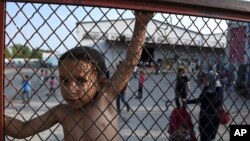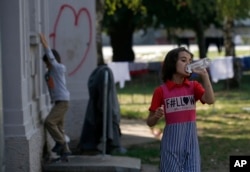The U.N. children's fund finds thousands of refugee and migrant children are more vulnerable to deportation and exploitation today than when the European Union-Turkey agreement to stop mass migration flows from Turkey into Europe was enacted one year ago.
UNICEF acknowledges the EU-Turkey deal succeeded in significantly decreasing the number of refugee and migrant children on the move in Europe. However, it notes a disquieting increase in the threats and distress these children endure.
UNICEF says the underlying causes that prompted children and their families to make the perilous journey across the Mediterranean Sea one year ago remain, as millions of people are still affected by the conflicts in Syria, Iraq and Afghanistan.
"We observe a very concerning increase of the number of children kept under detention because of their migration status," said Lucio Melandri, UNICEF senior emergency manager. "So, we see in many countries a number of children that are simply detained for long periods and they are finally kept under what we define as unacceptable situations."
Melandri says children who are locked up in detention or stranded on an island for long periods of time suffer from psychological problems. Rather than remaining trapped in Greece or Italy, he says, many unaccompanied children take matters into their own hands to escape.
They will "try alone to contact criminal organizations, to try to cross borders in the night," Melandri said. "In many cases, these children who are moving alone are leading them to be eventually identified, put under detention. In many cases, we are observing with concern an increasing trend of migrants but, particularly, even children that are simply pushed back."
Under the EU-Turkey agreement, 120,000 refugees were supposed to have been relocated from Greece and Italy into other European Union member states. To date, UNICEF reports, just over 14,400 children and their families have found new homes, mainly in France, Germany and the Netherlands.
Melandri says the EU should live up to its promises by protecting refugee and migrant children and not leaving them in substandard conditions and emotional distress.





